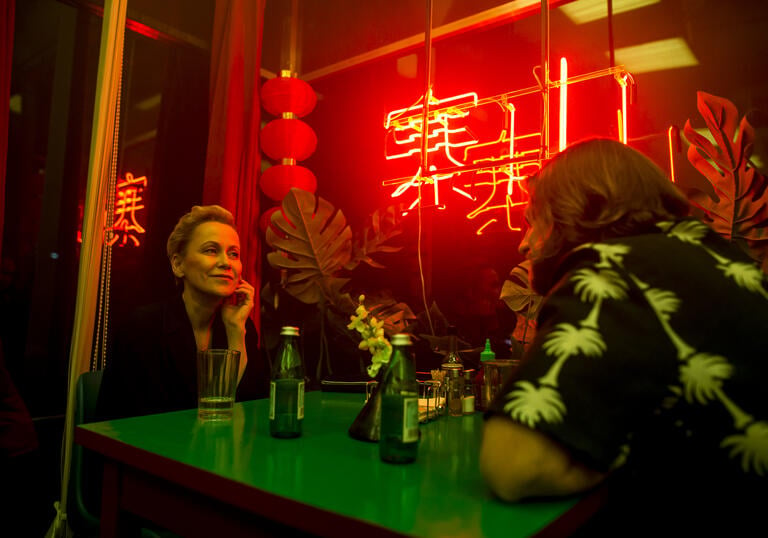
The Company
Cast
Rohtko Juris Bartkevičs
Wolt vendor 1/Orion Anastapolou Kaspars Dumburs
Hai Yan Huang
Actor Andrzej Jakubczyk
Ann Freedman Rēzija Kalniņa
Actress Ilze Ķuzule-Skrastiņa (originally performed by Ērika Eglija-Grāvele)
Destiny Hope, performer and waitress Katarzyna Osipuk
Wolt vendor 2/Domenico de Sole Artūrs Skrastiņš
Jack Smith, Muesum Director Mārtiņš Upenieks
Mell Rohtko Vita Vārpiņa
James Vulture, journalist Toms Veličko
Tao Xiaochen Wang
Creative Team
Text and Dramaturgy Anka Herbut
Director Łukasz Twarkowski
Set Designer Fabien Lédé
Costume Designer Svenja Gassen
Music Designer Lubomir Grzelak
Video Artist Jakub Lech
Lighting Designer Eugenijus Sabaliauskas
Choreographer Pawel Sakowicz
Assistant Directors Diāna Kaijaka, Adam Zduńczyk, Mārtiņš Gūtmanis
Assistant Dramaturg Linda Šterna
Assistant Costume Designer Bastian Stein
Assistant Video Artist Adam Zduńczyk
Camera Operators Arturs Gruzdiņš, Jonatāns Goba
AV Technicians Uldis Grass, Kristaps Taburs, Gustavs Smalkais-Francis
Sound Engineer Didzis Herberts Cielava
Video Engineers Jana Jaunbērziņa, Andrjus Jaņuns
Props Managers Annika Auziņa, Gunta Sakša
Lighting Engineers Edgars Brākmanis, Māra Vaļikova
Technical Manager Mārtiņš Vigups
Stage Crew Dāvis Rābants, Rūdolfs Štrāls, Artis Andersens, Pāvels Busigins
Make-up Ginta Puišele-Anuševica
Wardrobe Ivonna Straume
Surtitles Operator Ēriks Saksons
Stage Manager Iveta Boša
Producer Ginta Tropa
International production and distribution Vidas Bizunevicius
Script Translator (into Latvian) Ingmāra Balode
Script Translators (into English) Ingmāra Balode, Anka Herbut, Linda Šterna
Translators (rehearsals) Diāna Kaijaka, Elza Marta Ruža
Event information
Running time:
3 hours and 55 minutes, including an interval.
Age guidance:
14+
Content warning:
This production contains smoking, very loud and occasionally sudden music, haze, strobe lighting and flashing lights.
Ear plugs will be available upon entry to the auditorium.
The show is performed in Latvian, English, Chinese and Polish with English surtitles.
Filming
Audience filming will take place on Thu 2 October. For more information, please speak to a member of Barbican staff.
Presented by the Barbican
The Barbican presentation of ROHTKO is supported by the Adam Mickiewicz Institute, Polish Cultural Institute in London and the British Council under the UK/Poland Season 2025.
Production: Dailes Theatre, Riga, Latvia. In co-production with JK Opole Theatre, Poland and the Adam Mickiewicz Institute.
Co-financed by the Ministry of Culture and National Heritage of the Republic of Poland and the Ministry of Culture of the Republic of Latvia.
‘Un nouveau monde’ by Octave Noire (P&C Yotanka Records) is used in the performance.
Photography: Artūrs Pavlovs
ROHTKO was first premiered on 12 March 2022 at Dailes Theatre, Riga, Latvia
ROTHKO, ROTKHO or ROHTKO?
Spelling mistake or intentional statement? The misspellings ROHTKO and ROTKHO play into the production’s central theme: the relationship between the fake and the original, and how famous brands are often imitated with counterfeit names such as Adibas or Dolce & Banana. It draws on Graham Rawlinson’s hypothesis – known as the typoglycaemia effect – which suggests that the human brain can still read text as long as the first and last letters of each word remain in place. So, what do you think: is a ROTKHO or a ROHTKO really any different – or less valuable – than a ROTHKO?
Trailer
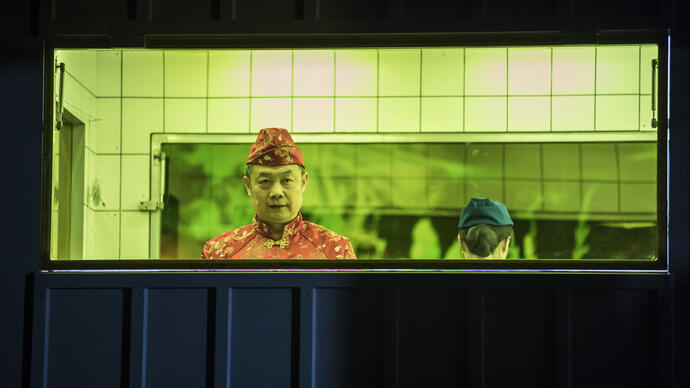
Trailer - ROHTKO
Get a sneak peek at this monumental production.
Writer’s note
This is not a play about Mark Rothko. This is not even a play about Mark Rohtko. In a 1999 issue of the New Scientist, Graham Rawlinson claimed and demonstrated that written text can be understood no matter what order the letters in a word are in – the only important thing is that the first and last letter are in the right place. However, the spelling error in the title of the show reveals something more. Our intention was not to present a biographical performance, although Rothko’s personality is, indeed, fascinating and his paintings, in the words of American art critic Jerry Saltz, act as ‘Buddhist television sets’. We were more interested in the portrayal of the artist (both male and female), the unwritten rules of the art market, as well as the self-evidence and assertiveness with which value – either emotional, intellectual, or market – is attributed to art.
Can good art be cheap?
What is good art?
What is art?
Alternative answers can be sought, for example, in the Chinese shanzhai concept, discussed by philosopher Byung-Chul Han in the book Deconstruction in Chinese Philosophy, where he explores the strict distinction between copy and original. What does this distinction mean in the context of art and beyond? Such division posits that the original is the principal embodiment of truth, value and individuality, while the copy is mere imitation and repetition. Chinese thought leads in a different direction – closer to what, paradoxically, Rothko also explores.
Rothko – the artist who didn’t paint the work bearing his signature, which was sold at the Knoedler Gallery in New York for $8.5 million. The very same artist who insisted that if something is worth doing once, it’s worth doing many times. One of the artists associated with the Fluxus group, Robert Filliou, once said that art is everything an artist calls art. However, nowadays it’s not so simple. Today, art is more defined by what a curator, gallerist, collector, influencer, NFT creator, entrepreneur or buyer labels as art.
There also exists the countercultural concept which suggests that every living body’s encounter with the world, every experience we have, is art. One of the characters in this show, Destiny Hope, speaks about the tears of a performance artist that were supposed to flow while she was standing in front of Rothko’s paintings. However, the tears were unable to flow, remaining in the realm of intention on one hand, and the state of continuous potentiality on the other. Destiny Hope allows the tears to manifest within her own body – the body of an actress. She promises to gift them to the future when people will no longer feel anything when looking at art. For now, she bestows them upon us.
Anka Herbut
Glossary
NFT – non-fungible token
An NFT – non-fungible token – is designed to prove ownership of the immaterial things in virtual reality. When two things have the same function, they are fungible, like for example, money. Two different Euro coins are fungible. Nonfungibility means that you cannot exchange one thing with another, which makes that one thing unique. Through the unique NFTs the digital artists (celebrated in likes) can sign and sell their works (memes, gifs, tweets and any kind of digital works which can still be copied by anyone). They retain the copyright and reproduction rights. To put it in terms of physical art collecting: anyone can buy a Rothko print, but only one person can own the original.
Blockchain
Blockchain is a system of recording information in a way that makes it difficult or impossible to change, hack or cheat the system. A blockchain is essentially a digital ledger of transactions that is duplicated and distributed across the entire network of computer systems. It is cryptographically secure and decentralised. Blockchain is transparent at the level of data flow, but at the same time allows users to remain anonymous. Blockchain has enabled a proven method of operating a digital currency (cryptocurrency) to appear – independent of central banks and financial institutions.
Provenance
Provenance is a record of ownership of a work of art that traces the history of its ownership, helping to verify its authenticity and value. In the NFTs field provenance appears as a blockchain – it provides tracking and tracing of digital items, their authenticity and source.
Radical care
Radical care is an intentional process of producing relationships between humans and non-humans or artificial intelligence that increases compassion, and encourages the sharing of social capital (and any other capital) and level of intersectional awareness. It seeks to empathically demonstrate experiences, needs and desires in order to build a community based on mutual caring. It aims to raise awareness of the interdependence of all of us, it means to care about those who are not us.
Daugavpils
Daugavpils is a state city in south-eastern Latvia, located on the banks of the Daugava River, from which the city gets its name. It is the second-largest city in the country after the capital Riga. Daugavpils is the birth city of the artist Mark Rothko and houses the Mark Rothko Art Centre. Born in Daugavpils in 1903, Mark Rothko emigrated at the age of 10 to the United States.
Shanzhai
Shanzhai means ‘fake’. It’s a Chinese neologism initially describing forgeries of branded products. But shanzhai adapt very fast to new conditions and exploit their potential to improve. These products are inspired by the original, then depart from it only to mutate into new originals by themselves. Shanzhai undermines the power of the original, the authority and expertise. It deconstructs creation as an act of making things ex nihilo and has a playful, anarchic energy.
Discover more
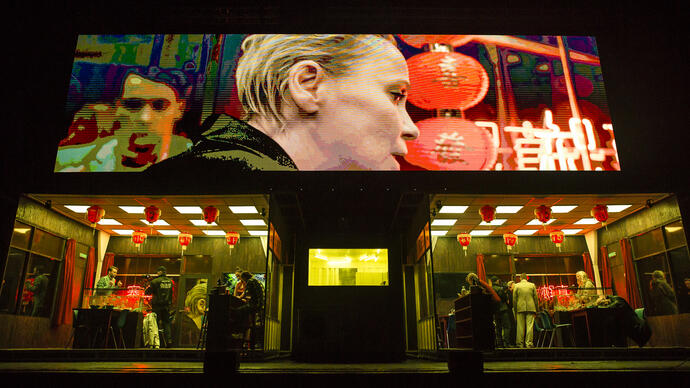
Interview: Łukasz Twarkowski on the provenance of art
Poland’s leading contemporary director Łukasz Twarkowski discusses one of his most impressive theatre show to date, straddling the border between theatre, film, and video art.
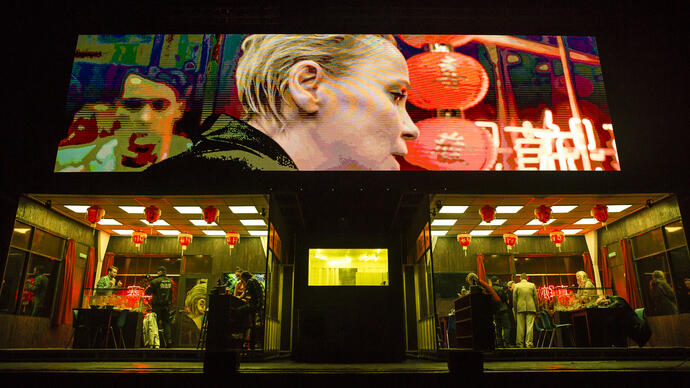
Go fake yourself! The Guardian on ROHTKO
"Theatre doesn’t have to be boring" – discover more about this monumental production in this Guardian article.
Biographies
Director
Łukasz Twarkowski (1983, Poland) creates multimedia performances combining theatre and visual arts. He places his projects in the context of extending reality through multimedia. A crucial element of Twarkowski’s creative work is investigating the ability and limitations of theatre as a medium and tool of communication. By permanent deconstruction of narratives, questioning the fixed habits of the audience and by meaningful usage of new media, Twarkowski creates a new, original language of stage performance based on multimedia and, more widely, digital technologies. In using these, Twarkowski analyses and observes increasingly complex relations between the real, the symbolic and the imagined. His projects are programmed at important festivals and stages around the world, among others: Odéon – Théâtre de l’Europe, Ruhrtriennale, Skirball Cultural Center in New York, Piccolo Teatro di Milano, Festival de Otoño in Madrid, Münchner Kammerspiele, Wiener Festwochen, Holland Festival, Southbank Centre in London, Onassis Stegi in Athens, Taiwan Performing Arts Center and Seoul Performing Arts Festival. Recently, he was awarded the Premi Ubu in Italy, The Faust German Theatre Prize and the Distinguished Artist Award by the International Society of Performing Arts. From 2023-2024 he was an associated artist of the Onassis Foundation, and in 2025 became an associated artist of Piccolo Teatro di Milano.
Major works
2012 KLINIKEN / Love is colder than…
2013 Akropolis
2015 Black Sun
2017 LOKIS
2019 Es war einmal… das Leben
2020 RESPUBLIKA
2022 ROHTKO
2023 The Employees
2023 WoW
2024 QUANTA
2025 ORACLE
Awards
2016 Golden Cross Stage Award for best video artist (for Heroes’ Square)
2017 Golden Cross Stage Award for directing (for LOKIS)
2021 Golden Cross Stage Award for best ensemble (for RESPUBLIKA)
2023 Spēlmaņu nakts Latvian Theatre Award for director and Grand Prix for best show (for ROHTKO)
2024 Grand Prix for best show at the International Theatre Festival Kontakt (for The Employees)
2024 Premi UBU for best foreign performance presented in Italy (for ROHTKO)
2024 The Faust German Theatre for the best use of multimedia and sound (for WoW)
2025 Golden Cross Stage Award for directing (for QUANTA)
Below, from left to right: Łukasz Twarkowski (photo by Beatrice Borgers), Anka Herbut (by Alicja Kielan) and Fabien Lédé (by Fabien Lédé)
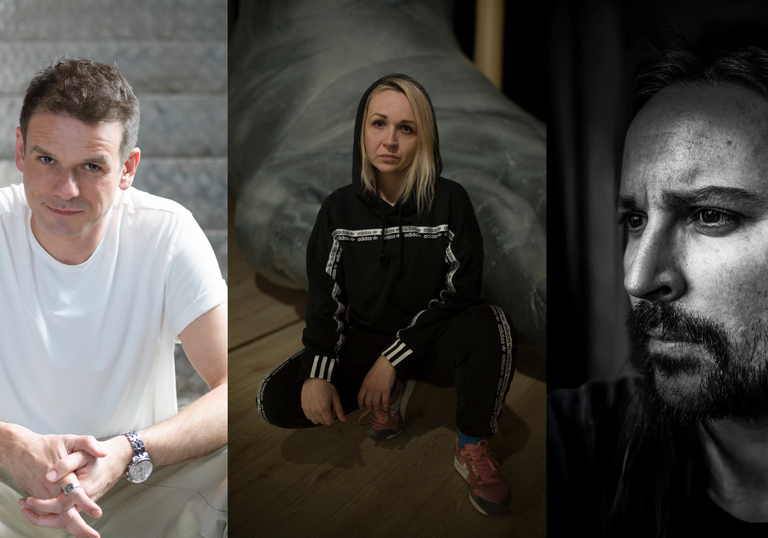
About Dailes Theatre, Latvia
Dailes Theatre is the largest professional theatre in the Baltic States, with a history and traditions stretching back over a century.
The artistic vision and drive of the theatre were created by its founder, the legendary director Eduards Smiļģis whose dynamic style shaped the theatre for more than 40 years. His aesthetic was based on what was, for his time, a bold and radical style of visual expression. Today that tradition continues, with new innovations and aesthetic challenges driving the artistic direction of the theatre.
Every season, audiences of more than 200,000 watch a variety of productions staged in the Main Hall and the New Hall. Existing performances are complemented by around eight new performances every year. Productions showcase stage design, props and costumes that have been custom-made in our own on-site workshops.
In spring 2020, a new, ambitious management team took up posts with the theatre. Artistic Director Viesturs Kairišs is considered one of the most prominent contemporary directors of Latvian theatre and cinema, with extensive international experience. General Manager Juris Žagars is an experienced producer of artistic projects such as the Cesis Arts Festival, one of the oldest contemporary art festivals in Latvia, as well as being one of the leading actors of Dailes Theatre until his appointment in 2020.
We want our audiences to experience challenging, entertaining, moving and inspiring theatre. We champion new works from writers all over the world, as well as breathe new life into the classics; we bring critically acclaimed hits from other countries as well as the best from our own Latvian writers.
About JK Opole Theatre, Poland (co-producer)
JK Opole Theatre was founded in 1975. The building is the largest dramatic theatre in Poland: its main large stage has an auditorium able to accommodate nearly 600, as well as a small stage, the Modelatornia Stage, and the Bunker Stage.
Each season, a minimum of six new premieres appear in the repertoire, and nearly 300 performances are presented. The theatre regularly presents its performances at prestigious national and international festivals, where it has won numerous awards. It is one of the most dynamically developing theatre centres in Poland, as well as a valued partner in the international arena.
JK Opole Theatre organises an international contest called Modelatornia Theater Project Competition. The idea is to create a place where artists from around the world are able to conduct experimental research and creative explorations inspired by the theories of Jerzy Grotowski. We want JK Opole Theatre to become a place of common research free from short-term political trends, and open to artistic development and cooperation with institutions in Poland and abroad. For over 40 years, JK Opole Theatre has run one of the largest Polish theatre festivals, Opole Theatre Confrontations / 'Living Classics'.
JK Opole Theatre is an autonomous institution with its own costume and scenography workrooms and institutional and technical departments.
About the Adam Mickiewicz Institute
The Adam Mickiewicz Institute (AMI) brings Polish culture to people around the world. Being a state institution, it creates lasting interest in Polish culture and art through strengthening the presence of Polish artists on the global stage. It initiates innovative projects, supports international cooperation and cultural exchanges. It promotes the work of both established and promising artists, showing the diversity and richness of our culture. The Adam Mickiewicz Institute is also responsible for the culture.pl website, a comprehensive source of knowledge about Polish culture. For more information please visit iam.pl
About the Polish Cultural Institute, London
The Institute's focus lies in promoting Polish culture and heritage to British audiences, as well as developing collaborations and building bridges between key cultural and academic institutions in Poland and the UK. Through nurturing these relationships, providing access to essential cultural resources and offering support through funding, PCI London can successfully showcase the best of Polish art, film, theatre, music, literature, science and heritage to culturally diverse residents of the UK.
instytutpolski.pl | Instagram @polish_culture
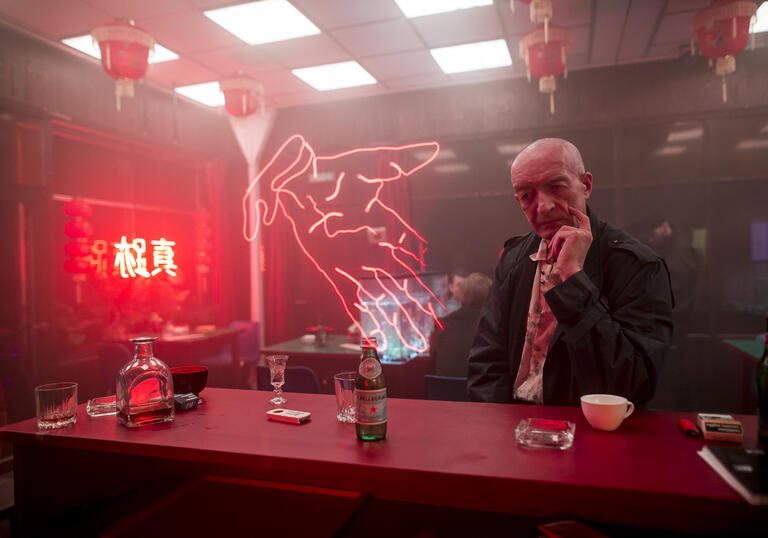
For the Barbican
Barbican Centre Board
Chair
Sir William Russell
Deputy Chair
Tijs Broeke
Deputy Chair
Tobi Ruth Adebekun
Board Members
Munsur Ali, Michael Asante MBE, Stephen Bediako OBE, Aaron D’Souza, Zulum Elumogo, Robert Glick OBE, Jaspreet Hodgson, Sir Nicholas Lyons, Mark Page, Anett Rideg, Dr Jens Riegelsberger, Jane Roscoe, Irem Yerdelen
Barbican Centre Trust Chair
Robert Glick OBE
Trustees
Stephanie Camu, Cas Donald, David Farnsworth, Ann Kenrick, Sir William Russell, Sian Westerman OBE
Directors
Chief Executive Officer
David Farnsworth (Interim, until Dec 2025)
Abigail Pogson (from Jan 2026)
Deputy CEO (Interim) & Director for of People, Culture & Inclusion
Ali Mirza
Director of Development
Natasha Harris
Head of Finance & Business Administration
Sarah Wall
Director for Buildings & Renewal
Dr Philippa Simpson
Director of Commercial
Jackie Boughton
Director for Audiences
Beau Vigushin
Director for Arts and Participation
Devyani Saltzman
Executive Assistant to CEO
Hannah Hoban
Executive Business Manager to the CEO
Abigail Carlin
Theatre Department
Head of Theatre and Dance
Toni Racklin
Senior Production Manager
Simon Bourne
Producers
Liz Eddy, Jill Shelley, Fiona Stewart
Assistant Producers
Mrinmoyee Roy, Mali Siloko, Tom Titherington
Production Managers
Jamie Maisey, Lee Tasker
Technical Managers
Steve Daly, Jane Dickerson, Nik Kennedy, Martin Morgan, Stevie Porter
Stage Managers
Lucinda Hamlin, Charlotte Oliver
Technical Supervisors
Malhar Kawre, Charlie Mann, Josh Massey, Matt Nelson, Adam Parrott, Lawrence Sills, Chris Wilby
Technicians
Martin Black, Kendell Foster, David Kennard, Burcham Johnson, Bart Kuta, Christian Lyons, Blaine Mitchell, Fred Riding, Fede Spada, Matt Turnbull
PA to Head of Theatre
David Green
Production Administrator
Caroline Hall
Production Assistant
Ashley Panton
Stage Door
Julian Fox, aLbi Gravener
Marketing Department
Head of Marketing
Jackie Ellis
Deputy Head of Marketing
Ben Jefferies
Senior Marketing Manager
Kyle Bradshaw
Marketing Manager
Rebecca Moore
Marketing Assistants
Maria Andaya, Ossama Nizami
Communications Department
Senior Programming Communications Manager
Hannah Carr
Press Consultant
HBL
Communications Officer
Sumayyah Sheikh
Communications Assistant
Andrea Laing
Heads of Department
Head of Cinema
Rebecca Fons
Head of Visual Arts
Shanay Jhaveri
Head of Creative Collaboration
Karena Johnson
Head of Creative Programming, Immersive
Luke Kemp
Head of Commercial Partnerships and Strategy, Immersive
Patrick Moran
Head of Cross Arts Planning and Strategic Operations
Fiona Pride
Head of Music
Helen Wallace
Audience Experience
Senior Audience Experience Managers
Oliver Robinson, Liz Davies-Sadd
Ticket Sales Managers
Lucy Allen, Jane Thomas, Bradley Thompson, Alex Steggles
Ticket Sales Team Leaders
Molly Barber, Máire Vallely, Nicola Watkinson, Charlotte Day
Operations Managers
Tabitha Fourie, Aksel Nichols, Ben Raynor, Mo Reideman, Samantha Teatheredge, Hayley Zwolinska
Audience Event & Planning Manager
Freda Pouflis
Venue Managers
Catherine Campion, Scott Davies, Maria Pateli, Lotty Reeve, Shabana Zaman
Assistant Venue Managers
Sam Hind, Bronagh Leneghan, Melissa Olcese, Daniel Young
Crew Management
Dave Magwood, Rob Magwood
Access and Licensing Manager
Rebecca Oliver
Security Operations Manager
Naqash Sheikh
Audience Experience Coordinator
Ayelen Fananas
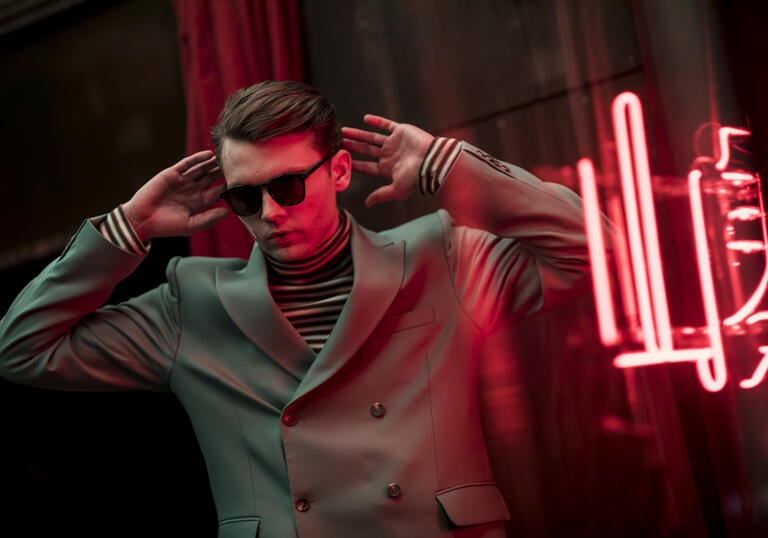
With thanks
The Barbican sparks creative possibilities and transformation for artists, audiences and communities – to inspire, connect, and provoke debate.
As a not-for-profit, we need to raise 60% of our income through fundraising, ticket sales, and commercial activities. With the help of our generous supporters, we are able to share the work of some of the most inspiring and visionary artists and creatives, enabling the widest possible audience to experience the joy of the arts.
We’re passionate about expanding access to ensure anyone can participate in art and creativity in London and beyond. From our work with local schools to provide unforgettable learning experiences, to development opportunities for emerging creatives, to discounted tickets to our events, your support helps us make a real difference every day.
There are many ways you can support the Barbican, including by making a donation, joining our programme as a sponsor, or becoming a Member. To find out more and join our community, please visit www.barbican.org.uk/join-support/support-us or contact [email protected]
Founder and Principal Funder
The City of London Corporation
Major Supporters
Bagri Foundation
Bukhman Foundation
In Memory of John Murray
Kiran Nadar Museum of Art
SHM Foundation
Tia Collection
Leading Supporters
Trevor Fenwick and Jane Hindley
Marcus Margulies
Programme Supporters
Blanca and Sunil Hirani
Clore Wyndham
Erica Roberts
Estrellita and Daniel Brodsky
Harry G. David
Goodman Gallery
Lonti Ebers
MENAEA Collection, Kuala Lumpur
Mandy Cawthorn Argenio
Natasha Sidharta
Romilly Walton Masters Award
The Rudge Shipley Charitable Trust
Barbican Patrons
Director’s Circle
James and Louise Arnell
Farmida Bi CBE
Philippe and Stephanie Camu
Cas Donald
Alex and Elena Gerko
Trevor Fenwick and Jane Hindley
Professor Dame Henrietta L. Moore
Daniel Siddall
Sir Howard Panter and Dame Rosemary Squire
Sir William and Lady Hilary Russell
Ben Warner
Sian and Matthew Westerman
Principal Patrons
Natrium Capital Limited
S.Ghanbari
Ruth and Stuart Lipton
James Penney
James Drummond
Premier Patrons
Abdullah B.S. Al-Saud
Sam and Rosie Berwick
Lynn Biggs
Dame Elizabeth and Mr Michael Corley
Dicle Guntas
Julian Hale and Helen Likierman
Sir Nicholas and Lady Felicity Lyons
Soo Hitchin
Isabelle Pasa
Jens Riegelsberger
Philip Romanos
Sir Paul and Lady Jill Ruddock
Richard Russell
Romilly Walton Masters Award
Rebel Wilson
T. Volkheimer and J. Hollister
Patrons
Matt Astill
Zumrut Arol
Dr Denise Bennett
Nicholas Berwin
Jo and Tom Bloxham MBE
Professor Geraldine Brodie
Adam Chamberlain
Tony Chambers CBE
F. Charlwood
Tim and Caroline Clark Dr Gianetta Corley
Erica and Neil Cosburn
Matthew Courey
Tim and Catherine Cox
Fernanda Diamant
Davide Giordano
Robert Glick OBE
Felicity Guinness
Richard Hardie
Malcolm Herring
Charles Hoare Nairne
Sajid Hussein
David Kapur
Ann Kenrick
Phillip Keir
Colin Kirkpatrick
Neil and Tracy Lawson-May
Peter Lim
Susan Lim
Mrs Flora Lyon
Jack Mactaggart
Camilla Mash
Frederic Marguerre
Mayerson Family
Robert McHenry and Sally Lloyd-Bostock
Andrew McIver
Sir Paul Morgan and Sheila Harvey
Siobhan and Simon Morgan
Sharon Newton
Professor Dame Linda Partridge and Mr Michael Morgan Mark Page
Oliver Pauley
Ben and Christina Perry
Keith Salway
Nicola Sawford and Michael Hadi
Carlos and Devy Schonfeld
Richard and Elizabeth Setchim
Stephan Solomonidis
Mary Tapissier and family
Philip and Irene Toll Gage Foundation
Steven Tredget
Richard Williams
Robert Willicombe
Sarah Wood Irem Yerdelen
Sonya Zuckermanand to all those who wish to remain anonymous
Corporate Partners
Apple Original Films
Audible
Bloomberg Philanthropies
Culture Mile BID
Google Arts & Culture
Mastercard
Sotheby’s
Taittinger
TOAST
Corporate Members
American International Group, Inc.
Bank of America
Bloomberg
BMO
Bolt Burdon Kemp
Deutsche Bank
DLA Piper UK LLP
Linklaters LLP
Macfarlanes LLP
Norton Rose Fulbright
Osborne Clarke
Pinsent Masons
Slaughter and May
Standard Chartered
UBS
Trusts & Grantmakers
Adam Mickiewicz Institute
The Ampersand Foundation
Art Fund
Aspect Charitable Trust
CHK Foundation
Cockayne – Grants for the Arts
John S Cohen Foundation
The Daiwa Anglo-Japanese Foundation
Embassy of Ireland
Embassy of the Kingdom of the Netherlands
The Garrick Charitable Trust
Goethe-Institut London
The Great Britain Sasakawa Foundation
Henry Moore Foundation
Institut français du Royaume-Uni
Korean Cultural Centre UK
Lucille Graham Trust
Mactaggart Third Fund
Performing Arts Fund NL
Polish Cultural Institute London
Royal Norwegian Embassy in London
Stanley Thomas Johnson Foundation
We also want to thank Barbican Members and the many thousands who made
a donation when purchasing tickets.
The Barbican Centre Trust Ltd, registered charity no. 294282
